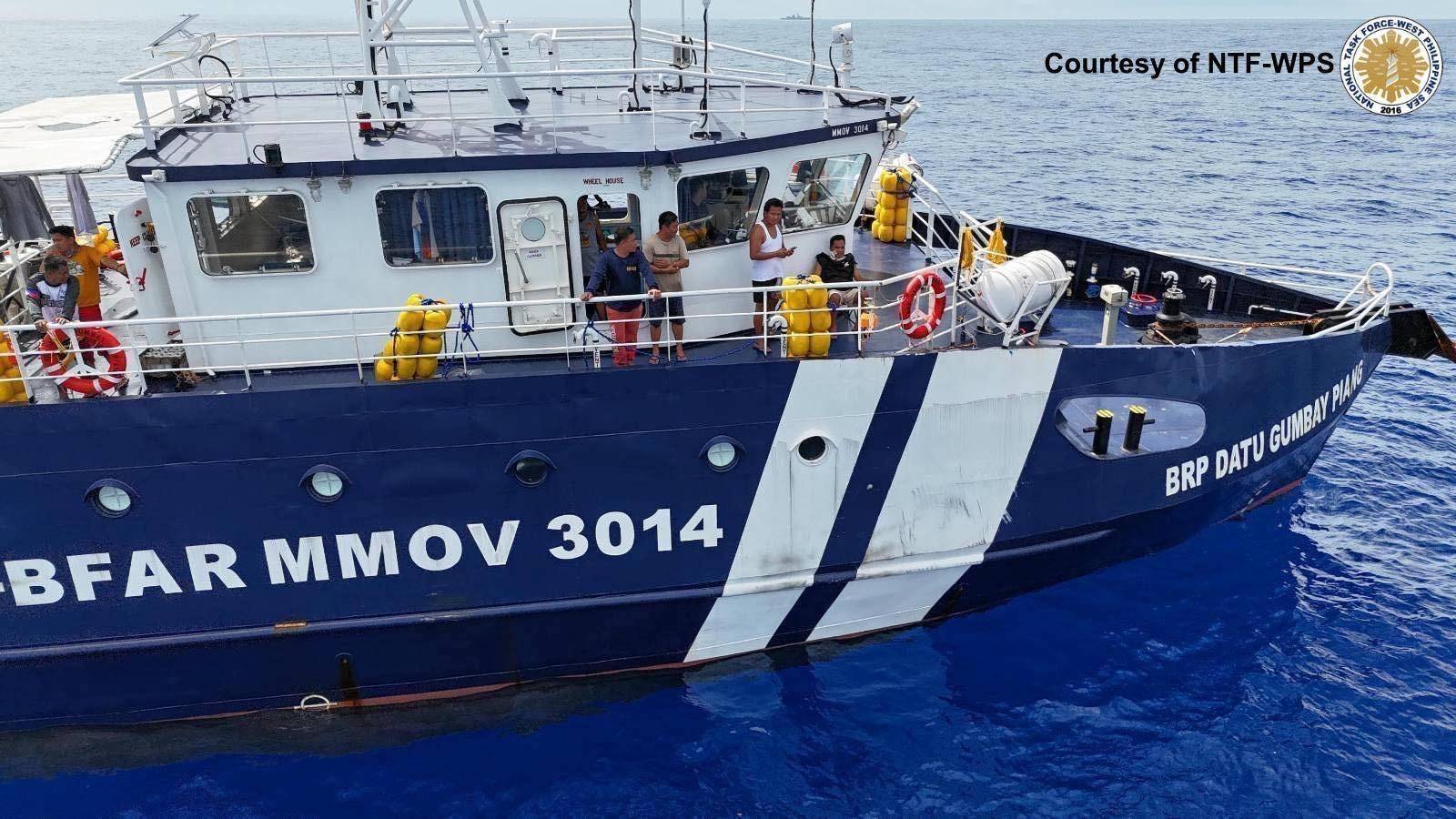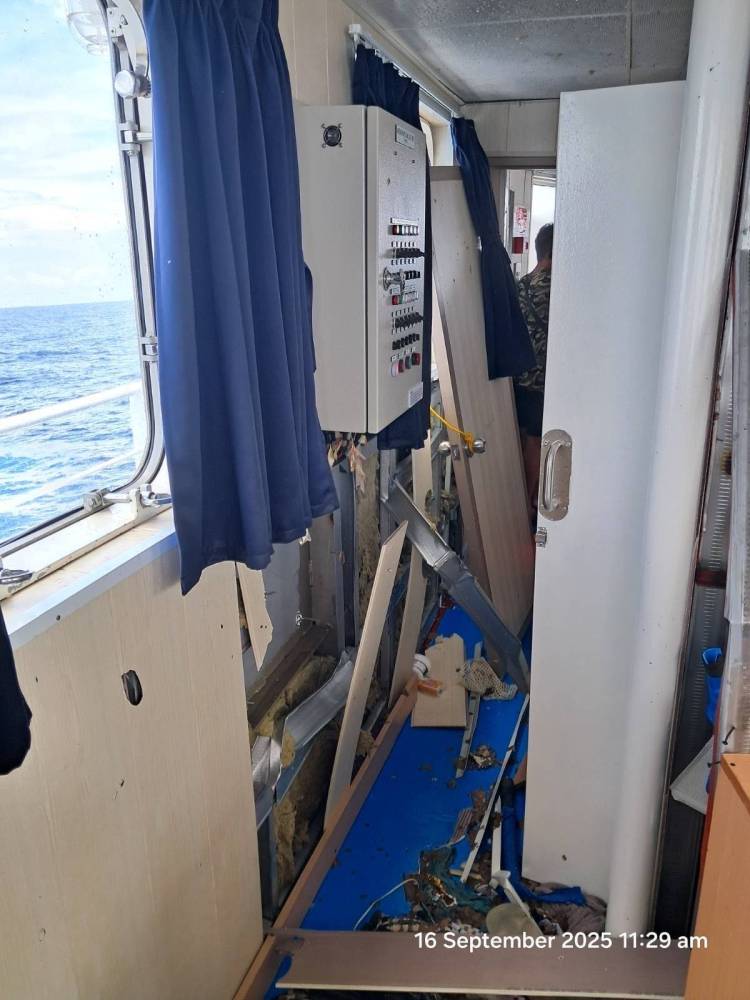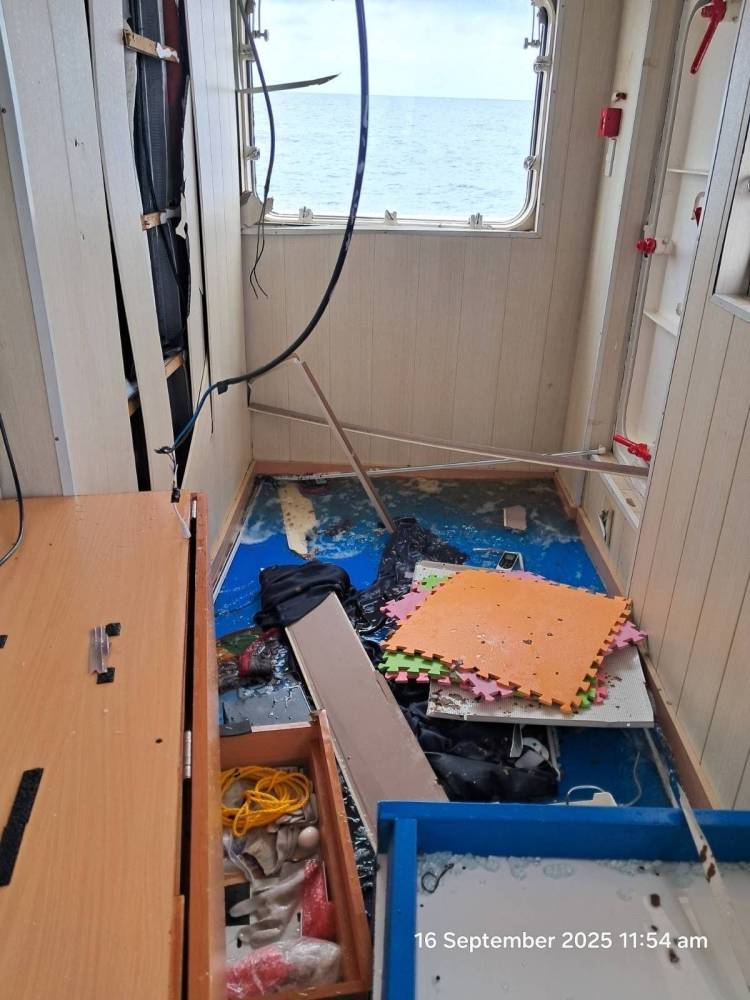PCG refutes China’s ‘collision’ claim in Panatag incident

It was not a collision.
This was what the Philippine Coast Guard (PCG) said on Wednesday in reply to China’s accusations that a Philippine fisheries vessel deliberately collided with a China Coast Guard (CCG) ship near the disputed Panatag (Scarborough) Shoal.
The PCG cited video evidence and eyewitness accounts that the incident was caused by aggressive water cannon attacks from Chinese vessels.
“There’s no collision that really happened. It was a [Bureau of Fisheries and Aquatic Resources] vessel on stationary, subjected to a water cannon by two China Coast Guard vessels. And the China Coast Guard vessel did a sharp turn enough to at least touch the bow of the BFAR vessel. So there was no collision,” said Commodore Jay Tarriela, the PCG spokesperson for the West Philippine Sea.
“It was their own like bump-me-something, creative digital editing,” he added.
False claims
The incident occurred during a government resupply mission on Tuesday near Panatag (also called Bajo de Masinloc), where more than 10 Philippine government ships—including 10 BFAR vessels, two PCG ships, and one civilian vessel under the Department of Agriculture’s Kadiwa program—escorted about 40 Filipino fishing boats.
China claimed that a Philippine vessel intentionally rammed one of its ships, as reported by state media outlet Global Times.
Significant damage
The report stated that the Philippine government organized over 10 vessels to “illegally intrude” into the waters of Huangyan Dao (Panatag Shoal) and that CCG ships took regulatory measures, including issuing warnings and using water cannons. China described the alleged incident as “unprofessional and dangerous” and held the Philippines fully responsible for the so-called collision.
Tarriela, however, said these claims were false.

The PCG reported that the most serious water cannon attack occurred at 9:43 a.m. Tuesday, when CCG vessel 5201 targeted the BFAR vessel BRP Datu Gumbay Piang about 26 kilometers (14 nautical miles) east of Panatag. The attack went on for nearly 30 minutes and resulted in “significant damage,” including shattered bridge windows, disabled air-conditioning and electrical systems, and a minor injury to a crew member struck by glass fragments.
At least two other BFAR vessels were also subjected to water cannon assaults but sustained no damage.
Tarriela said the Philippine operation, part of the Kadiwa para sa Bagong Bayaning Mangingisda program, aimed to deliver fuel subsidies, ice, and grocery supplies to local fishermen while ensuring their safety amid persistent Chinese harassment. A total of 30,000 liters of fuel and 20 tons of fresh fish were distributed before the mission concluded at 6:30 p.m. Tuesday.
‘Illegal, hostile’
The National Maritime Council (NMC) on Wednesday condemned China’s “illegal and hostile actions.”
The NMC also noted that a Chinese People’s Liberation Army-Navy (PLAN) warship issued a radio broadcast announcing a live-fire exercise near Panatag, which alarmed Filipino fisherfolk operating in the area.
“These provocative and dangerous actions … placed lives and vessels at risk and clearly violate international law,” the council said, citing the 1982 United Nations Convention on the Law of the Sea (Unclos) and the 2016 arbitral ruling that affirmed Filipino fishing rights in the area.
The Philippines called on China to halt what it described as “illegal, provocative and dangerous activities” in the West Philippine Sea and to help create an environment conducive to diplomacy and dialogue.

Outside China’s control
Despite the water cannon incidents, the PCG maintained that Panatag remains outside China’s “effective control.”
“The mere fact that more than 10 Philippine government vessels and 40 Filipino fishing boats were there proves they cannot prevent us from accessing the area,” Tarriela said.
He added that the announced live-fire exercise appeared to be “just a threat to scare our fishermen into leaving the area.”
Governed by int’l law
“They have no right to conduct exercises in our exclusive economic zone. These waters are governed by international law and the 1982 [Unclos], and China’s claims and declarations do not give them jurisdiction here,” he said.
Tarriela shared lessons learned from the deployment of numerous BFAR vessels, noting that the large presence of government ships boosts the confidence of Filipino fishermen in returning to Panatag.
“As our fishermen have said, when they see the Coast Guard and BFAR ships, they feel safer and less threatened by Chinese vessels,” he said.
Tarriela vowed that government patrols and resupply missions would continue despite Chinese threats and the declaration of a so-called national nature reserve by Beijing in the area.
“We will not stop patrolling Bajo de Masinloc. Our operations will go on to ensure the safety and livelihood of Filipino fishermen,” he said. —WITH A REPORT FROM THE ASSOCIATED PRESS

















Lessons from Gbagbo’s failed ICC prosecution